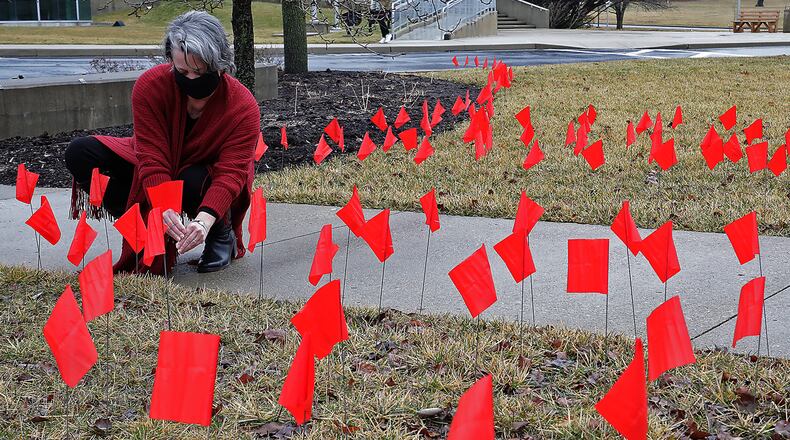“We adopted the Red Flag Campaign this academic year to enhance our domestic violence and sexual assault prevention efforts. However, we were already focused on these efforts,” said Melinda Van Noord, counseling services coordinator.
The public awareness campaign is visual with the main focus being red flags posted around campus as well as educational posters on display that explain the types of abuse and how to properly respond, according Van Noord.
Van Noord said the campaign is “aimed at changing social norms.”
“The intent is to focus on bystander intervention and helping students recognize when their friends are in troubled relationships; when they see the red flag, the warning signs, [we want them] to say something. We want people to speak out when they see something wrong,” she said.
The campaign also includes social media and educational awareness programming.
The college’s Sexual Violence Prevention Team, established in 2020, will use the campaign in campus programming such as awareness events and prevention training to encourage students to say something when they see something, the release stated. The team is made up of seven members: one faculty, four staff, one student, and is led by Nina Wiley, Dean of Student Engagement and Support Services.
Due to the coronavirus pandemic, the team has had to adjust programming and move things online, such as education sessions, Active Bystander Intervention Trainings and Trauma 101 training, Van Noord said.
Other events and training the team has provided include the Clothesline Project (a display of T-shirts decorated to honor survivors of domestic violence or send messages of hope to survivors) and the “What Were You Wearing” exhibit, which displays sexual assault survivors’ clothing and their personal stories and aims to shatter myths that contribute to victim-blaming.
Van Noord said the campaign isn’t related to an increase in abuse on campus and that students are most likely needing help with abuse happening outside of the college such as in their homes or relationships.
According to the college’s annual campus security report, there were no reports of any type of abuse for 2017-2019. The statistics for 2020 are not yet available.
“According to the CDC, 36 percent of college students have experienced some sort of abusive behavior,” Van Noord said. “It’s one of the common reasons that people seek counseling at Clark State. I think the campaign will work well with our campus. Because we aren’t a residential campus, a lot of students come to us with concerns happening at home.”
Van Noord said the top three reasons people seek counseling is depression, anxiety and abuse.
“The abuse is related to a past or present relationship or happened in their childhood,” she said. “Many of the students seen for counseling have some type of abuse in their past, even if it is not the reason they are seeking counseling.”
The campaign was established in 2007 and was developed by sexual and domestic violence prevention experts, college students, victim advocates and college personnel. For more information, visit theredflagcampaign.org.
If you or a friend needs immediate help call 911. Help is also available by calling Clark State College Counseling Services at 937-328-7961, Project Woman’s 24-Hour Crisis Line – 1-800-634-9893 or the National Domestic Violence Hotline at 800-799-7233.
About the Author

